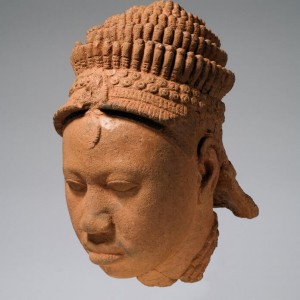
Moremi was an important historical figure, wife of one of the ancient heroes of post-Oduduwa times, possibly Oranyan. Moremi is today reckoned as a Yoruba legend due to acclaimed moves she made to end the acts of terrorism that threatened the town of Ile-Ife. As a beautiful woman, Moremi tactically took the risk of allowing herself to be captured during one of the raids by a group of Yoruba dissidents or tribe known as Igbo (probably not present day Igbo people). Others, appalled by the unusual costuming with which their aggressors melted out their horror, believed Igbos were demi gods, so did not dare to confront them.
Driven by patriotism, Moremi had, after an act of supplication besides a stream called Esinmirin, followed her personal plan to demystify the Igbos. She was captured, and on account of her beauty, preserved for their leader who initiated marriage rites. It did not take long to find the enemies’ weakness. They feared fire because they had fuel on their bodies, the Ekan grass or bamboo fibres craftily made into scary costuming, with which they have fooled the people of Ile Ife for years. Moremi, having secured the friendship of the terrorists and affection of their leader, escaped to her people to share this idea with them, and the Igbos were rounded up on their next attempted raid.
Now, this heroine, remembering her promise to the deity at Esinmirin River, repaired to the stream with offerings of lambs, rams, goats, and then bullocks, but the god will not accept any of those. The priests divulged her son was the only acceptable sacrifice. Moremi gave up her only son and the people of Ife, grieved over her lost, promised to be her sons and daughters.
The story is also told of how Ela, also called Olurogbo, the son of Moremi rose again to make a rope to heaven. It is also asserted that Ela will come again to the world to reap the rewards of his good deeds. This appendage story of Ela’s rising from the dead has been described by modern commentators as a possible indication that the Yoruba nation was at its early years aware of Christianity which must have been as a result of Oduduwa’s abortive effort to evangelize, being an Egyptian Christian himself. The travails of Moremi has been celebrated in several theatre performances including Wole Oguntokun’s play premiered in conjunction with MUSCON in Lagos; Legend of Moremi Ajaasoro





















